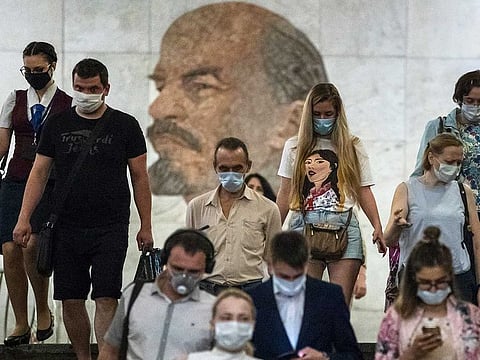Earlier coronavirus second wave feared in Europe after mass protests
Experts predict surge of coronavirus infections in coming weeks

Brussels: Europe could face a surge of COVID-19 infections in the coming weeks caused by mass protests in the continent over the last days, European Union officials and experts said on Thursday.
Tens of thousands of protesters have crowded together in Europe’s big cities in recent days to demonstrate against racism after the killing in the United States of George Floyd while in police custody.
“If you advise everybody to keep one and half meter from each other, and everybody just stands next to each other, holding each other, then I don’t have a good feeling about that,” Jozef Kesecioglu, who chairs the European Society of Intensive Care Medicine, told a conference.
Asked whether there could be a surge of infections in the coming two weeks, he said: “Yes, but hopefully I’m wrong.” Most countries in the 27-nation bloc have passed the peak of the outbreak and are gradually reopening business and borders, as infections went gingerly down in past weeks.
Before recent protests, scientists expected a second wave only after the summer. But mass gatherings might impact this positive trend.
“As for any infectious respiratory disease, mass events could be a major route of transmission,” Martin Seychell, a health official at the EU Commission told Reuters when asked about the possibility of an earlier second wave caused by demonstrations.
The virus was still circulating, although at lower rates than some weeks ago, he said.
The likelihood and size of a second wave would depend on the effective maintaining of social distancing measures and other factors, many of which are still unknown, he said.
EU sets out plans to reopen borders
Brussels set out plans to reopen the EU’s internal borders on Thursday, even as the global coronavirus outbreak hit worrying new landmarks in the United States, Latin America and Russia.
The European Commission recommended that the 27 EU members fully reopen their frontiers with each other on June 15 and with the western Balkans from July 1.
Europe’s borders with the world beyond will open more gradually after that - and only to countries where the pandemic is seen as under control.
The United States, which has the world’s highest number of deaths and infections, marked a grim new milestone as recorded cases surged past two million Thursday.
Russia meanwhile passed the symbolic milestone of 500,000 confirmed cases, and Iran said 180,000 have been infected there.
Meanwhile, the death toll in Latin America passed 70,000 fatalities on Wednesday, according to an AFP tally of official figures.
Brazil, the region’s worst-hit country, accounts for more than half of the total deaths in the region.
In all, the novel coronavirus has killed at least 416,000 people since the outbreak emerged in China last December, according to an AFP tally of official sources.
At least 7.3 million cases of coronavirus have been registered in 196 countries and territories.
‘Prepared for the worst’
Ukraine on Thursday reported an “alarming” rise in cases, after a daily record of 689 new infections and outside Europe, in huge countries like India, Iran and Brazil, fear is rife.
In New Delhi, exhausted doctors at the Max Smart Super Speciality Hospital said they may not be able to cope if the easing of a lockdown that once curbed the movement of 1.3 billion sees a surge in cases.
- with inputs from AFP and Reuters







